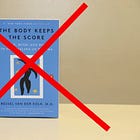Time To Give Up
Admitting defeat is a form of hopefulness.
On August 12, 2017, I was in Charlottesville, Virginia, protesting against a neo-Nazi rally with thousands of other anti-fascists. It felt good, not only because I deemed myself on the right side of history, but because I was surrounded by so many people who were so similar to me. People who were down to fight. We had power in numbers.
At one point that day, I thought we were gonna win; that the Nazis would retreat from the city, that we’d kicked them out. We were celebrating. Cheering and waving signs as we marched. And that’s when the car hit. James Alex Fields plowed his Dodge Challenger into the crowd. I was a few feet away. I saw Heather Heyer die. I got other peoples’ blood on me.
Eventually, after a few cigarettes to quell the shaking in my hands, my friends and I left the city. I wasn’t upset, or scared. I just felt numb.
And then, a month later, I had a mental breakdown.
It took years to recover from that—from, essentially, losing my mind. In some ways, I’m still not better—still not able to project the same confidence in my life, still not able to feel intense emotions as strongly without spiraling, still not able to live the life I was able to live before Charlottesville. There are more bumps in the road now.
This was deemed by various professionals to be PTSD, an imperfect diagnosis, as all are, but to be sure the one closest to the truth. And the things I did to recover from that, the typical things one with PTSD is supposed to do, helped a lot. Therapy (analytic and somatic), acupuncture, yoga.
But no matter how much better I got—no matter how close to some theoretical baseline my nervous system returned—there was one persistent symptom that was nearly impossible to shake: the feeling of uselessness.



